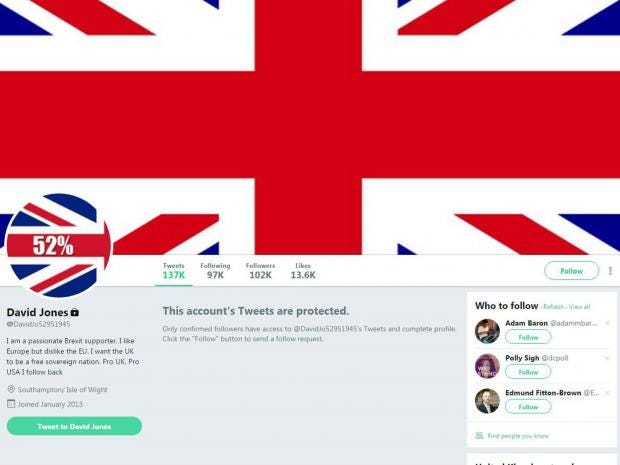More than 150,000 Russian-language Twitter accounts posted ten of thousands of messages urging Britain to leave the EU in the days leading to the Brexit vote, it has been revealed.
 At least 400 of the accounts sought to inflame fears about Muslims and immigrants in an effort to influence the referendum vote by sowing seeds of discontent and persuading people to vote “Leave”.
At least 400 of the accounts sought to inflame fears about Muslims and immigrants in an effort to influence the referendum vote by sowing seeds of discontent and persuading people to vote “Leave”.
New findings about the disinformation campaign are the strongest evidence yet of Russia’s attempts to use social media to manipulate British politics in the same way the Kremlin has been found to have done in the US and France. Weakening the EU and dividing Western Europe is a prime goal of Russian foreign policy and the Kremlin celebrated when the Leave campaign sealed its surprise victory with 51.9% of the referendum vote.
The research was led by Oleksandr Talavera and Tho Pham of Swansea University, working with a separate team at the University of California. They said the Russian accounts had posted very little about Brexit issues in the run-up to the referendum but became very active at the last minute.
Their daily posts went from around 1,000 two weeks before the vote to 45,000 in the last 48 hours and 39,000 on the day the results were announced.
“It is very strange that someone whose language is Russian tweets in English,” Pham said. She described it as “an anomaly” that had prompted the researchers to look more closely at some of the most active accounts under suspicion.
 The Russian town of Gelendzhik, on the banks of the Black Sea, has a population of just 55,000 but was one of the centres of Twitter activity. According to Twitter, one of its inhabitants is Svetlana Lukyanchenko, a voracious user of the social platform who signed up in May 2016, less than a month before Britain voted to leave the EU.
The Russian town of Gelendzhik, on the banks of the Black Sea, has a population of just 55,000 but was one of the centres of Twitter activity. According to Twitter, one of its inhabitants is Svetlana Lukyanchenko, a voracious user of the social platform who signed up in May 2016, less than a month before Britain voted to leave the EU.
‘Sveta1972’, as she called herself online, did not fit the profile of someone interested in British politics. Yet in the four days before the June 23 vote she posted or retweeted at least 97 messages mentioning “#Brexit”.
Her messages were overwhelmingly pro-Brexit and often repeated conspiracy theories. On June 21 she retweeted a story by the website Zero Hedge that said Britons were “appalled and disgusted” by a Brexit postal ballot “fraud”.
Later that day she tweeted that the EU was an “unelected assembly of corporatist agents” imposing debt and austerity “on all member states”. On the day of the referendum her Twitter account urged Britain to “make June 23rd our Independence Day.”
After the vote she lost interest, confining her 12,000-plus tweets to subjects such as lighting design websites or free e-books on web traffic. Despite her Russian origins, most of her tweets were in English, Spanish or Italian.

According to the two teams of researchers “Sveta1972” was one of thousands of suspect Russian accounts tweeting copiously about Brexit in the run-up to the vote.
Tracking 156,000 accounts in Russia, the research found that their mentions of #Brexit spiked on the day of the vote and the day after, before dropping off almost entirely. The accounts include genuine commentators but many appeared to be either fully automated bots or semi-automated “cyborgs” — bots with some human involvement.
These included Stormbringer15, a virulently pro-Kremlin Twitter power-user with 241,000 posts mainly asserting Russia’s rights over Ukraine. On the day after the referendum he tweeted a fake picture of President Putin giving a medal to Nigel Farage.
Tweets posted by the Russian accounts were often sent at 4am UK time, or 7am in Russia. They were probably seen many millions of times.
The findings will fuel concerns that the Russian state has weaponised social media. Damian Collins, chairman of a parliamentary committee investigating fake news, said that he had written to Facebook and Twitter to ask for “urgent clarification and information regarding Russian-linked accounts”.
Separate research from the Oxford Internet Institute and City University has revealed the scale of bot activity around Brexit. Oxford researchers found that 30 “highly automated” accounts posted 135,597 tweets from June 20-24.
These were viewed about 11 billion times. While there is no direct connection between the bots and the Russian state, intelligence officials in Britain and the US are confident that many have been backed by Moscow.
by Bob Graham
The post Brexit: Was the Referendum Hijacked? appeared first on Felix Magazine.
No comments:
Post a Comment